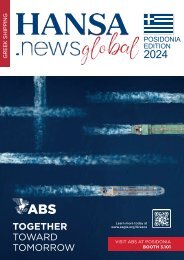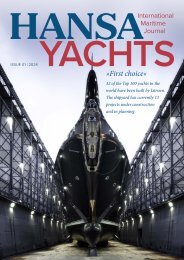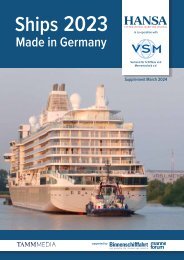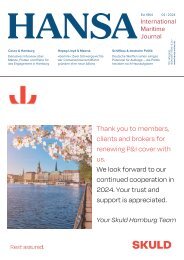HANSA 12-2017
BBC Chartering | Jones Act | Glory Amsterdam | Hellespont | CMA CGM & LNG | Multimodalität | X Freight | Lübeck | Rostock | Hamburg | Neue Katamarane | MSC denkt neu
BBC Chartering | Jones Act | Glory Amsterdam | Hellespont | CMA CGM & LNG | Multimodalität | X Freight | Lübeck | Rostock | Hamburg | Neue Katamarane | MSC denkt neu
Sie wollen auch ein ePaper? Erhöhen Sie die Reichweite Ihrer Titel.
YUMPU macht aus Druck-PDFs automatisch weboptimierte ePaper, die Google liebt.
Schifffahrt | Shipping<br />
Humanitarian »threat« to Jones Act<br />
<strong>2017</strong> saw an unprecedented weather pattern, in the form of Atlantic Ocean hurricanes,<br />
which disrupted supply chains on land and at sea. These upheavals focused all eyes on the<br />
future of the Jones Act – a nearly 100 year old set of regulations. By Barry Parker<br />
In normal times, maritime trade between<br />
U.S. ports (including Alaska<br />
and Hawaii, but also Puerto Rico) is reserved<br />
for »Jones Act qualified« vessels<br />
built in U.S. yards, owned by U.S. interests,<br />
and crewed by U.S. mariners. However,<br />
in times of unusual circumstances<br />
– such as hurricanes and other natural<br />
disasters, the U.S. Department of Homeland<br />
Security is permitted to waive the<br />
Jones Act, thereby allowing non Jones<br />
Act vessels into specified trades. The legalities<br />
of waivers are highly complex,<br />
and are subject to interpretation.<br />
In <strong>2017</strong>, three waivers were issued. The<br />
disruption of the tanker trades by Hurricane<br />
Harvey (late August) and Hurricane<br />
Irma (early September) brought<br />
about two waivers (issued Sept 8 th and<br />
11 th), while the need to move supplies<br />
to Puerto Rico after Hurricane Maria<br />
brought about a third waiver (issued<br />
Sept 28 th). In all three cases, the waivers’<br />
timeframes were temporary, their<br />
durations ranged from 7 to 11 days.<br />
The events are all history now, the<br />
waivers have expired. The conditions<br />
giving rise to the first two waivers (related<br />
to movement of refined oil products<br />
on tankers) no longer exist. Refineries<br />
in Texas have re-opened, landside pipeline<br />
movements have resumed, and vessels<br />
no longer sheltering from storms are<br />
back on their normal voyage routings.<br />
The deleterious situation with Puerto<br />
Rico, in contrast, is ongoing, with a painfully<br />
slow process of returning to normalcy;<br />
there are also questions about the actual<br />
legality of the Sept 28 th waiver, which<br />
was only issued after extreme political<br />
pressure was placed on the Trump administration.<br />
Lawyer Charlie Papavizas, Partner<br />
at Winston & Strawn, explains the difference<br />
among waivers, telling <strong>HANSA</strong>:<br />
»The period of time type general waivers<br />
– which really started with Hurricane Katrina<br />
in 2005 – have mostly focused on the<br />
movement of petroleum products. Similar<br />
waivers were granted after Hurricanes<br />
Rita, Sandy and Harvey. The Hurricane<br />
Maria waiver followed that pattern, but<br />
covered all products, which I think is unprecedented.«<br />
And then, there is the tie<br />
to national security and safety, with Mr.<br />
Papavisas saying: »The only way to waive<br />
the Jones Act administratively, meaning<br />
other than by an Act of Congress, is via a<br />
1950 law. That law requires that it be in the<br />
»interest of national defense« to waive the<br />
law (or any other navigation law).«<br />
Another expert on Jones Act matters,<br />
Michael Cavanaugh, Partner in the Washington,<br />
D.C. offce of Holland & Knight,<br />
expressed concerns about the legality of<br />
the waivers. He explained: »The statute,<br />
46 U.S. Code §501 states waivers may<br />
only be granted in two situations: (1) On<br />
request of the Secretary of Defense, the<br />
Secretary of DHS »shall waive compliance<br />
with those laws to the extent the Secretary<br />
considers necessary in the interest of national<br />
defense.« Or (2) If the Secretary of<br />
DHS »considers it necessary in the interest<br />
of national defense.« The Secretary of DHS<br />
»following a determination by the Maritime<br />
Administrator…of the non-availability<br />
of qualified United States flag capacity<br />
to meet national defense requirements,<br />
may waive compliance with those laws<br />
to the extent, in the manner, and on the<br />
terms the individual, in consultation with<br />
the Administrator, acting in that capacity,<br />
prescribes.« We did not see any announcement<br />
by the Secretary of Defense which<br />
would have satisfied the first criteria.<br />
»There does not appear to be a<br />
legal basis for the waiver«<br />
Mr. Papavisas, from Winston &<br />
Strawn, offered his take on this aspect,<br />
adding: »The interesting thing about the<br />
Harvey and Maria waivers is that they<br />
were undertaken under the provision<br />
of the law that does not require a finding<br />
that no U.S.-flag vessel capacity is<br />
available for the movement or movements<br />
which must be done by MAR-<br />
AD. One can surmise that this was done<br />
because such a finding was not likely to<br />
be made.« Mr. Cavanaugh, from H &K,<br />
elaborated further: »When the acting<br />
DHS Secretary issued the Puerto Rico<br />
waiver, there was also no announce-<br />
22 <strong>HANSA</strong> International Maritime Journal – 154. Jahrgang – <strong>2017</strong> – Nr. <strong>12</strong>


















